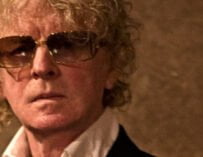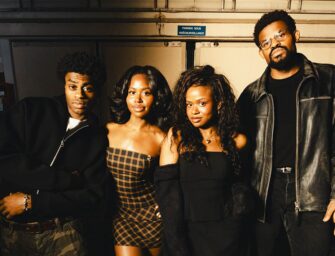
Ian Hunter: “My whole life has been a drama!” Photo: Ross Halfin
In this first half of a bumper Q&A feature, the Mott The Hoople frontman and glam rock legend reveals all
It was 1969 when a band with the unpromising name of Silence came to the attention of notoriously eccentric Island Records producer Guy Stevens. He liked the group but he didn’t rate the singer, Stan Tippins, so auditions were held for a band that Stevens rechristened, after a Willard Manus novel about a circus freak show, Mott The Hoople.
Enter Ian Hunter, a seasoned frontman who was already heading for 30. Four critically acclaimed albums followed but it would be 1972 before the band hit the big time when David Bowie, dismayed that Mott had announced a split, offered the band All The Young Dudes.
A string of classic glam stomp singles penned by Hunter followed, including All The Way From Memphis and The Golden Age Of Rock’n’Roll. By the time Mott really did call it a day, in 1974, Hunter was a bona fide rock star. Solo success followed, with Hunter often collaborating with Mick Ronson of Spiders Of Mars fame, but, by the 1990s, it seemed as if Hunter’s career was winding down.
Then in 2001 came Rant, a state-of-the-world album that found Hunter re-energised. He’s kept up the quality since, with a series of albums that have showcased both his songwriting prowess and his ability to lead a band. Even in his 70s, he’s showing no signs of calling it a day.
Here, Hunter talks to Songwriting about his work as a writer, about working with bands, including his current Rant Band, and about his wider career.
Tell us a little about the recording of your new album, Fingers Crossed.
“I did the last one in 2012 so it’s three or four years – very organic, let it come. I’m not really a writer that sits down to write. I just get ideas that come into my head, and embellish them, it takes a while. You come off the road and, with writing, the idea process seems to be like a muscle. You come off the road and you’ve been selling, and now you have to put yourself back into writing mode. So it takes a while, but if I hang around long enough and I begin to hate myself, that’s when it comes.”
That’s quite a statement…
“[Laughing] Oh yeah, my whole life has been a drama!”
Is it a case of getting bored, or depressurising?
“You can’t wait to get home off the road and then, three weeks later, it’s like, ‘Oh God, I’ve got to do something!’. And then when it’s the last available thing I can think of, I force myself to go down and have a go. But then when the muscle tones up, you begin to get ideas, you begin to get a little perky with it. And then the next album will begin to take form.”
So how quick is the process for you? Do you come up with a lot of songs and dispense with a lot?
“I like to have four or five on the go because I normally wake up at 4am and that’s when I get the odd line here or there. I don’t really have to get up, I can run them through my mind and, if you’ve got three or four on the go, it’s good, because if you’re not getting anything for the first couple then you think about the third one and you get the odd line. It’s just getting going, getting the muscle moving.”
Do certain themes emerge over the process for each album. Rant, for instance, was a very political album. Do certain subject matters recur?
“The problem with getting older is (a) you can’t write love songs anymore because they sound disgusting; (b) you’ve been over a lot of territory. So it’s difficult to find new turf, so to speak. Having said that, it’s really fluky. Half the songs I get, it’ll be a title or it’ll be a short musical passage that sounds ‘hooky’ to me and words just come to it. And then, I’m prey to those words. The song, in other words, tells me – I don’t tell the song. And I’ll sit down and write. I’m not a professional writer, it’s more haphazard.”
Shane MacGowan once said something along the lines of he caught songs from the air…
“He’s right. Your antennas are up and sometimes you get the wrong one – this shouldn’t have come to me, this should’ve gone to the next one down the line. I write like the original writers wrote. I’m not metal, I’m not prog, I’m ballads, groove and rock’n’roll, you know?”
If that’s the initial inspiration, what about the process of honing a song, is that where the craft comes in? You’ve got to take it to a band and figure out how to hone it – how does that work for you?
“That would be more in the arrangement area than the actual song itself. They get the song. It’s the same with Andy [York], the co-producer. They get the songs finished, done. What they do with them is strictly arranging: they don’t really change the songs at all, but what they will do is say to me, ‘We don’t really think that one’s good enough.’
“I had that in Mott, I’ve had it all the way through – I like to be told the truth. Sometimes it’s weird, the song might be okay but it’s just not fitting. Some of them fall between the cracks, they don’t suit, but I’ve had the band 15 years and I’ve been working with Andy for 15 years so they’ll tell me if it’s not up to par in one form or another. They don’t want to co-write with me but they arrange.”

Ian: “They’re all my babies, you can’t really favouritise or the other ones sulk!” Photo: Ross Halfin
Let’s talk about some of the specific songs on Fingers Crossed. Ghost brings us back to groove and rock’n’roll because you’re talking about the Sun Studios there.
“There’s a guy called Rick Steff in Memphis. Turns out Rick Steff’s father performed with Elvis Presley, and he wanted to know if we’d like to go around Sun Studios. He took us in. If you’re a tourist you can go in Sun Studios, but there are certain little bits you can’t go, so he got us into those bits. I saw the demo machine that Elvis used in 1957, and it’s a bit grungy looking, which makes it even better. The room itself is haunted, it really is.
“We were in there and there’s guitars on the wall, there’s a little kit there, the room is so live you don’t even need sticks on the drums, you just play them with your fingers. There was a double bass. My guy plays double bass as well as electric so he was on that, and then they pulled the guitars off the wall and all of a sudden the room was swinging, it was great. You see the stars on the floor – the middle star is where Elvis was – and Bill Black and Scotty [Moore]. It’s all there and it’s a weird feeling and my keyboard player was on Jerry Lee [Lewis]’s piano. There was a big burn mark on the piano where somebody told him to stop smoking, he was smoking a cigar, so he just jammed the cigar in the piano. Jerry Lee was my original inspiration, so it’s pretty wild. And the piano’s not that great, kind of ‘ringy’. But Dennis, my keyboard player, was on it and he’s 20 years younger than me, my band are all a lot younger than me, but he says, ‘I’m feeling something weird’. Everybody was feeling something weird so I get back to the hotel and it’s, ‘I’ve got to write a song about that.’ I guess that’s my religion: Memphis and points south!”
Are there other songs you really like on the album?
“I like them all, they’re all my babies, you can’t really favouritise or the other ones sulk! The really irritating thing about my stuff is it seems to take people a while. They’ll come back after two or three years and tell me something’s really good, and I could have told them that originally. It took them a while to get there. I guess that’s my fault for not being explanatory enough.”
What about the title track, Fingers Crossed?
“That came last. I like the way the hook comes in – beautiful. I just got the first line, like we were discussing earlier. It’s just C and F on the piano, with a little Imagine-type lick. ‘I was pressed into service,’ and it’s like, what the hell does that mean? From there you go back to the pirates and privateers and all that kind of thing, but all I had was that one line.”
And what about Dandy, which is about David Bowie. Was that quite a difficult song to write? It felt like an extraordinary moment when Bowie passed…
“Well, it was. I had no idea, I hadn’t spoken to David in a long time, so it was a major shock. Very classy the way he did it too, typical David. I was writing a song called Lady and Lady turned into Dandy. Like I said before, I’m not like a pro songwriter, it just changed itself. You get affected by the moment.”
Is it a song you especially like?
“I like it because it’s very instant. The minute it starts, it’s woah! It’s really on the money, it’s on the ball, it’s very present. You’re instantly going to form an opinion about it, whether you like it or whether you don’t.”
That’s appropriate because it takes you back to the immediacy of glam rock
“Yeah, and that doesn’t happen to me anymore to me. That one, though, it was straight away in your face – which is a good thing.”
Going back, the first Mott The Hoople album has a lot of covers on it. Did you think of yourself as a songwriter back then?
“I didn’t join Mott as a songwriter at all. The songwriters were Pete [Overend Watts], the bass player, and [guitarist] Mick Ralphs. But what happened was, we were rehearsing in Islington, the gear was all in this room. We’d get there about three in the afternoon and I’d never seen gear like this before. They had all this stuff and I’d go there at 11 in the morning, just playing on this stuff they had – the organ, the piano, it was all there. We started picking songs out of bits and pieces I was playing. I didn’t even know what was relative, to be honest, on the keyboards then. And they both said, ‘You should write.’
“I had written a couple of things on the keyboard, but never seriously. With Mott, we were all selfish people, but when it came to music they were the most unselfish people, they really were encouraging with the writing. Pete soon gave up, he was like, ‘I can’t be bothered, you take over, you write the songs,’ so it wound up being me and Mick Ralphs.”
Was there competition to see who could get the songs on the album?
“No, it was great in Mott, it really was. Mick would come in with stuff, I would come in with stuff. We wouldn’t actually present them to the band, we’d just be playing them in the room and [Dale] ‘Buff’ [Griffin] or Pete, the drummer or the bass player, they would just come over and say, ‘What’s that? That sounds good.’ You never actually presented anything, it was stuff that got picked up in the rehearsal room. You hoped they would pick up on it. You might play something and you’d sing a little thing, and Mick Ralphs would do the same, and everybody would be, ‘We’ve got to do that.’ It was a great band that way, it really was. Mott was a very complicated band and it wasn’t easy, but in that area they were great.”
With the first four albums for Island, is there a song on those albums where you think, ‘That’s where I began to nail it as a writer?’?
“No, I think all the way through the Island records I was still finding my feet. We did get lucky on occasion. There was some nice stuff on an album called Wildlife [1971], I had a song called Waterlow, and The Original Mixed-Up Kid. A lot of people like Brain Capers [1971], but that was just banging away, it really was, with Guy driving us crazy.”

Hunter: “Mott was a troublesome band, it didn’t get anywhere easy, it was never managed properly.” Photo: Ross Halfin
Wildlife is terrific.
“I think it’s the Mott album [1973] where we actually found ourselves, where you could actually go woah! That was after the All The Young Dudes album [1972]. We’d learnt a lot off David [Bowie, who produced Dudes]. David had been with Tony Visconti, so David had a bit of a knowledge about the studio. Ronno [Mick Ronson] wasn’t there at the time with us. A lot of people think it was David and Mick that was helping out on Dudes, it wasn’t, it was just David. Mick came back in, I got him to do one song, Sea Diver, I got him to do an arrangement on that but I think we actually found ourselves on the Mott album, that was a complete album. I remember Roxy, Bryan Ferry and Eno, coming in and going, who was the producer? We played Bryan and Eno a couple of tracks, because we were in [recording studio] Air Two and they were in Air One and they were like, ‘What do you want a producer for? This sounds great.’ All of a sudden, it was all coming together, lovely.”
Do you think Bowie had an influence on your writing in terms of his professionalism and his work ethic? Was that important bearing in mind Mott had previously imploded?
“It was difficult because Mick Ralphs was thinking one way and I was thinking another. The problem was Mick really wanted to do a blues-y, soul sort of thing, but I couldn’t sing that stuff. That was the actual root of the problem. We didn’t know it at the time but it was simple: he was looking for a great singer to sing blues-y songs that he was writing, and he couldn’t have picked a better one, you know? [Ralphs left Mott to form Bad Company with Free singer Paul Rodgers.] Meanwhile, I got on to whatever I was doing. Was it influenced by David? Probably. I don’t know it was that far back. Very powerful personality, David.”
Some of the songs you wrote about Mott mythologised Mott while undercutting the band. With most rock star songs about bands, you just want the singer to shut up, but it never felt like that with those songs. Where did that ability to write about Mott come from?
“I don’t really know. I really did appreciate being in the band because I was 29 when I joined them. I’d been in factories. They hadn’t been in factories – I had, I knew what the alternative was going to be. Also, I had that working class thing. I knew what I was talking about, I’d just been doing it for 14 years, and then after a while when you’re in a band and you run out of the working class lyrics it’s like what do you write about?
“All I’ve seen is the band, hotels, limos and aeroplanes, that’s all I’ve seen. You start writing about the band because that’s all you know. And you don’t want it sounding corny, but it was kind of us against the world. Mott was a troublesome band, it didn’t get anywhere easy, it was never managed properly.
“We watched people like Roxy who were managed properly and we were dead jealous. It just seemed like we lurched from one disaster to the next, where if we’d had decent management from the off, steady, we might have done a little better, we might have felt more comfortable. But we had Guy [Stevens] and Guy was a f**king maniac. Loved him, glorious, but a maniac nonetheless.”
You’re calling to mind that footage of Guy during the recording of The Clash’s London Calling, smashing things up…
“Oh yeah, it was really silly but he was really insightful. It was not all craziness. He would stand there and tell me how wonderful I was. Everyone’s insecure. He was like the soccer coach, he would be right in your face. ‘You can do this, you can do that.’ What I had at the time was two layers down – he was the only one that noticed.”
Did you feel under pressure as a songwriter to keep coming up with the singles once Mott started being successful?
“After Dudes, the press were like, ‘Yeah, they can do it if David Bowie gives them a song, can’t do it on their own.’ That felt the most pressure there, and Mick and I both knew we had to write a hit just to prove we weren’t just this band that would get a hit with somebody else’s song. And then we got that, and then we got the next one, and then suddenly it turns into we’re a pop band.
“And now we’re playing to the masses, who aren’t usually as well informed as the people that we played to before. That’s another reason Mick Ralphs was getting fed up with it cos we weren’t a mass-type band. We did play to a lot of people, wound up doing 20,000 seaters in some areas over here [the US]. But it didn’t make any sense, it makes more sense if people really want to see you as opposed to let’s go and see those en masse.”
Looking back at the singles, is there one you especially liked, and why?
“All The Way From Memphis, because it’s legit. The one that followed Dudes was Honaloochie Boogie. Honaloochie Boogie, we were arguing in the studio, I’d written it and I just didn’t see the point, couldn’t understand. And they were going, ‘Well there is no point.’ And this is all new to me. ‘But it doesn’t make any sense.’ Honaloochie was a word that fit at the time. The whole idea was that eventually it would become a proper song with a proper title, but we couldn’t find anything. I’m going, ‘It doesn’t mean anything!’ and Pete and Buff were going, ‘It doesn’t matter.’ So there it went and it was a hit. But I really liked Memphis a lot. We had a great engineer in those days, Bill Price, he did a lot of people, anywhere from McCartney to Johnny Rotten. I guess that’s one of the reasons we also managed to produce ourselves…”
Interview: Jonathan Wright



































Related Articles